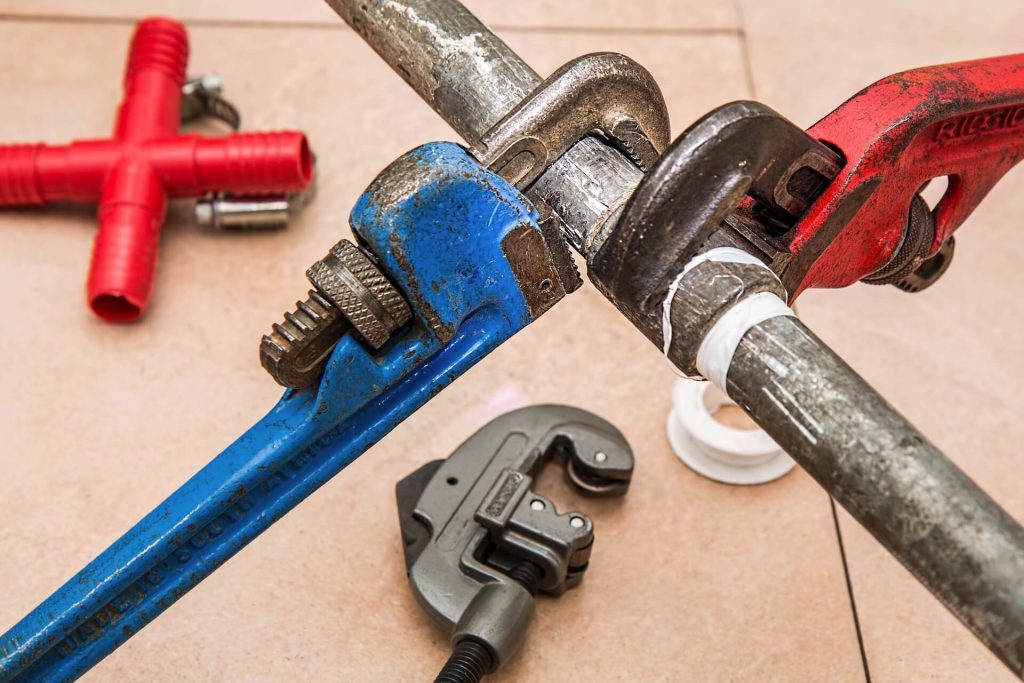How to Quiet Noisy Plumbing Pipes
April 13, 2018

From high-pitched squeaking to rumbling and banging, pipes can make a lot of noise for a lot of different reasons: high water pressure, water-filled air chambers, loose pipe straps, and more.
Sometimes the solution is simple, such as tightening pipe clamps. Other times, you will need to contact a plumber for professional troubleshooting. Try the following solutions to noisy pipes and don’t hesitate to contact Fix-It 24/7 if you have any questions.
How to Silence Shaking and Rattling Pipes
1. Tighten/Install Pipe Clamps
Go around your home and inspect all pipe anchoring locations. Many times, pipes are anchored to wooden floor joists using metal clamps.
- If any clamps are loose, tighten them.
- Replace any damaged or loose clamps as needed.
- Additional clamps can be installed. For horizontal pipes, keep clamps 6-8 feet apart; for vertical pipes, keep clamps 8-10 feet apart.
- Do not use galvanized anchors on copper piping.
Sometimes, the clamps are installed properly, but when the pipes contract and expand, squeaking or rattling sounds can still occur. Typically, this happens around hot water pipes.
If your hot water pipes are still rattling or squeaking, you may want to add some cushioning between the pipe and the clamp:
- Unscrew the pipe clamps.
- Place a piece of pipe cushioning foam or rubber blanket inside of the anchors near the noisy pipe.
- The cushion between the metals should prevent any rattling or squeaking.
- If the noisy pipe is outdoors, you can nail a piece of wood to the wall and then connect the pipe with a pipe strap.
- Make sure you leave a little room for expansion, especially around plastic pipes.
2. Add Pipe Insulation Sleeves
Not only will foam pipe insulation sleeves improve energy efficiency by insulating water temperatures, but they can also reduce pipe noise.
- Purchase pipe insulation foam from your local home improvement store and fit them around your hot and cold water pipes.
- Measure the pipes starting from the water heater.
- Then, cut the insulation sleeve to the proper length.
- Place the sleeve around the pipe so that the seam is facing down toward the floor.
- Finally, secure the pipe sleeve with electrician’s tape, duct tape, or cable ties. Do this for every 1-2 feet to keep the insulation in place.
- Make sure the pipes are completely dry (no condensation) before applying the pipe insulation sleeves.
How to Silence Banging Pipes (Water Hammer)
A water hammer can occur when you quickly turn off water to a faucet or appliance. The forceful water stoppage causes a hammer sound.
You may hear a water hammer if air chambers have filled with water. Air chambers are located behind fixtures and appliances to help cushion the shock of water coming to a sudden stop. They basically serve as an overflow valve when the faucet is closed. Unfortunately, air chambers eventually fill with water, which reduces its effectiveness.
Follow these steps to remove the water from air chambers and restore air:
- Turn off your main water supply (at the main water shut-off valve). This will cut water to the entire home.
- Next, turn on all of the faucets in your home. Wait until all the water drains out. This will clear all of your water pipes and air chambers.
- Then, close all of the faucets before turning the main water supply back on.
- This process should clear the water from your air chambers and fix noisy water hammer sounds.
If this doesn’t stop your banging water pipes, speak with a plumber about installing a water hammer arrester.
High-Pressure Pipes
If none of the above solutions softens the sound of your pipes, you may have high water pressure—anything above 80 PSI (pounds of pressure per square inch). You can test your water pressure with an inexpensive water pressure test gauge.
Your pipes’ PSI should read between 40 and 80. If your water pressure is too high, contact a professional plumber to add or adjust a pressure-reducing valve.
If none of these noise-reducing solutions have silenced your pipes, contact Fix-It 24/7 at (303) 214-0277 or schedule service online. We offer expert, on-time service 24 hours a day, 7 days a week.
Service You Can Count On
We came from humble beginnings, having started as just a small family
business. And while we’ve experienced growth, Fix-It 24/7







